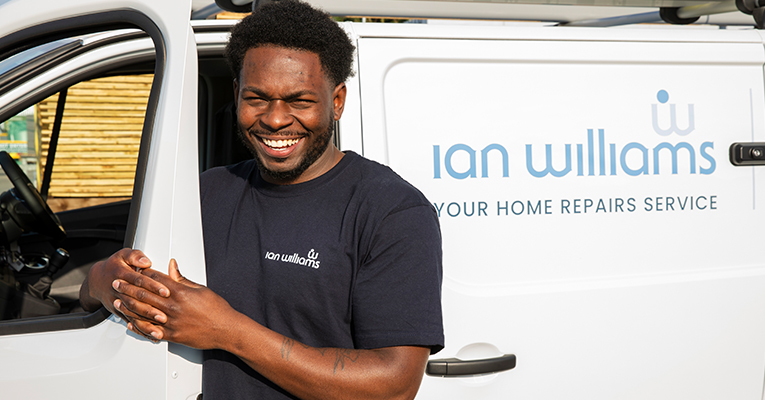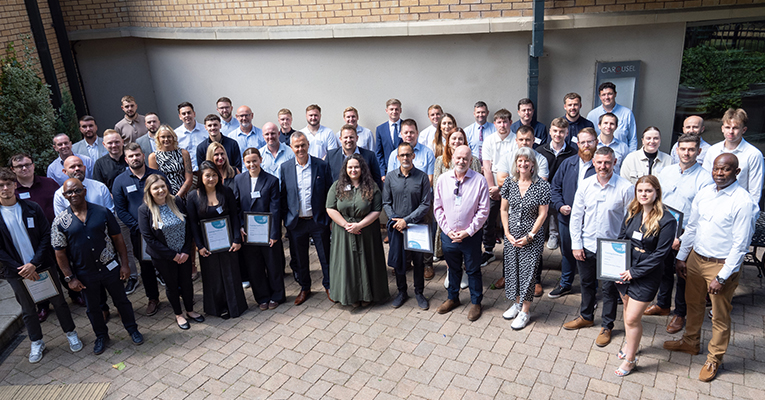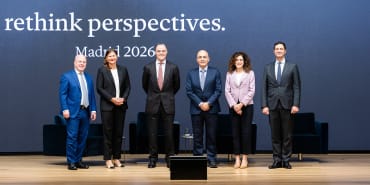Since 1946, UK-based property services firm Ian Williams has taken a people-first approach to building its business. Privately owned, the firm has no pressure from shareholders. Instead, they invest to develop careers from the ground up: many of Ian Williams’ leaders began as trainee surveyors with the company, while the apprenticeship programme – the Ian Williams Academy – has won national awards.
Ian Williams also has a deep commitment to leaving a positive footprint in the communities in which it works. The firm is a member of the UK’s ‘Paint Green’ waste reduction programme, and has pledged to achieve net-zero across Scope 1 and 2 emissions by 2035, and to eliminate Scope 3 emissions1 by 2050. Ian Williams also gives 1% of profits to charity each year via long-term partnerships and employee-led donations.
At Lombard Odier, as a private business owned and managed by our Managing Partners, we understand the deep, long-term value of investing in people. Though it can be tempting to chase short-term profits, experience over more than 225 years has taught us that business resilience and success across generations comes from building unity and a firm-wide culture of integrity, transparency and excellence.
In this series of interviews we are meeting some of the UK’s leading private businesses, so we can better understand their needs and the challenges they face, and identify the common themes that underpin their success. In this edition we were pleased to talk with Zane Poyner, Managing Director at Ian Williams, whose own career is a microcosm of the company’s approach to investing in people and building for the long term.
We invest heavily in development, that means we need to keep expanding the business to create opportunities for personal growth
You’ve been with Ian Williams for nearly two decades. What drew you to the company, and what’s kept you there?
I started out on a graduate scheme at [infrastructure and construction firm] Balfour Beatty, then joined Ian Williams almost by chance. What’s kept me here is the people.
related content.

our private banking expertise in the uk.
learn more Senior leaders took an interest in me early on and that shaped my journey – I’ve worked across divisions and taken on multiple different roles. Now I ask myself: “Am I still growing? And am I helping others to grow?”
The difference here is the investment in people. We invest heavily in development, that means we need to keep expanding the business to create opportunities for personal growth.
Read also: What’s your number? Valuing your business and defining your exit strategy
There’s a strong sense of unity and care for colleagues at Ian Williams. Where does that culture come from?
It’s rooted in the ownership. The Williams family has a long-term vision and a deep commitment to their values. When I was offered the job, I spoke to Richard Williams and his request was simple: “Make it the best business it can be.” That’s a powerful mandate.
Unlike publicly traded companies, we’re not chasing quarterly results – we’re building something enduring. That shapes how we treat people, how we make decisions, and how we invest in the future.

At Lombard Odier, one of our core values is ‘One Team’ – this is key to ensuring we’re all pulling in the same direction. You employ all of your tradespeople directly, rather than contracting out work, and you also operate across a widely dispersed geographical area. How do you maintain a unifying culture?
It’s not easy – but leadership makes the difference.
We’ve got 33 business units covering an area from Plymouth (in the South West) up to Middlesbrough in the North and back down to Maidstone (in the South East). And out of around 1,450 employees, 900 of them are tradespeople – they’re the backbone of our business.
Our biggest cultural driver is internal progression. Around 10% of our workforce are apprentices. We take on 20 trainee surveyors each year – many of our business managers and operations directors started in those roles, and two of our general managers were once carpenters. People can go a long way at Ian Williams – that creates a culture of possibility.

We see UK businesses struggling with government policies such as the recent national insurance rise – but at the same time we see a lot of exciting innovation and entrepreneurialism. What are the biggest challenges and opportunities of running a private business in your sector in the UK today?
Our biggest challenge is the skills shortage. There’s a huge business opportunity working in social housing, but we need to bring people in and develop them fast enough to meet that demand.
Brexit had a real impact, especially in the south east of the UK, where a lot of tradespeople left the country. So we’ve doubled down on training and development. As an individual tradesperson it’s relatively easy to start your own business – so we have to offer a compelling path for people to grow with us.
We’ve adapted by focussing on productivity and labour management – those are real strengths for us
Margins are tight in our industry, so any increase in national insurance hits hard. But we’ve adapted by focussing on productivity and labour management – those are real strengths for us.
related content.

entrepreneurs: bespoke wealth management.
learn more Overall, the UK is a good environment to grow a private business. We pay into the Construction Industry Training Board and get support for apprenticeships, and the housing market is buoyant.
Read also: Lombard Odier’s UK CEO describes ambitions to “meaningfully grow”
You have a strong commitment to sustainability as a firm – sustainability is also a big part of your work. What trends are you seeing in this area?
There’s a lot of investment going into it – the government has committed nearly GBP 3 billion to housing associations for retrofitting. The goal is to make homes carbon neutral.
Some of the work is for high-profile things like installing heat pumps or solar panels, but the basics matter too: insulation, double-glazing and reducing waste within a property.
It's not just about carbon reduction though – it’s also about making homes safe, warm and fit for purpose. There is a significant need for investment in the UK’s housing stock.
We’re investing heavily in digital transformation, including a GBP 1.8 million project to replace our enterprise resource planning system and digitise our processes
Ian Williams gives 1% of profits to charity each year. Can you tell us more about this?
We’ve got three strands to our giving. First, we have a foundation that supports employees who are fundraising or involved in community projects.
Second, we have a long-term agreement with the Lighthouse charity that support people in construction and their families. Furthermore, we also support a few standout charities like the MAZI Project in Bristol, which helps young people leaving care or prison by connecting them with restaurants and food wholesalers. We even donated a van to help them grow. Another is an organisation called Gympanzees, which provides accessible play and exercise spaces for children with physical disabilities.
And finally, each of our teams within the business (40+) units receives GBP 1,000 each year to donate to a cause of their choice. It’s personal, it’s fair, and it reflects our values.
What does the next phase of growth look like for Ian Williams?
We’re focussed on three areas – response and repairs, decarbonisation, and painting. Each has the potential to become a GBP 100 million business line in its own right.
We’re also investing heavily in digital transformation, including a GBP 1.8 million project to replace our enterprise resource planning system and digitise our processes. Over time, we see potential for artificial intelligence to support our teams – maybe even to act as a digital assistant to help surveyors double their output. We’re excited about what’s coming next.
Read also: Taxing times ahead: is your business succession plan fit for the new UK rules?
People, culture and a positive legacy
Our interview with Zane Poyner highlights a number of themes that we are increasingly seeing as hallmarks of successful private businesses, especially within the UK’s flourishing entrepreneurial landscape.
Private and family-owned businesses often take a long-term approach, aiming to build strong foundations and prepare for the next generation. A key part of this is understanding that a company’s people are its biggest asset, and that unity of culture and vision is essential, regardless of size or geographical spread.
Through our succession planning services we help families and entrepreneurs adopt a long-term outlook, building to ensure successful intergenerational transitions that act as a catalyst for business growth
More and more, successful firms are also determined to leave a positive legacy, with businesses aiming to cut their environmental footprint, create employment, donate profits, or offer volunteering opportunities for their employees.
At Lombard Odier, we are able to help entrepreneurs adopt these markers of success. Through our succession planning services – for which we were named world’s best at the 2025 Euromoney Awards – we help families and entrepreneurs adopt a long-term outlook, building to ensure successful intergenerational transitions that act as a catalyst for business growth.
Our wealth management for entrepreneurs ensures personal and family finances are optimally managed, freeing up business owners to focus on business growth. While our award-winning philanthropy services offer a ready-to-go structure for philanthropic projects, to help entrepreneurs leave a lasting legacy.
Like Ian Williams, we believe in taking the long-term approach. As Zane Poyner put it, “We’re not chasing quarterly results – we’re building something enduring.” We believe that is true of all successful private businesses, and we look forward to seeing how this thinking leads Ian Williams’ growth and future success.










share.